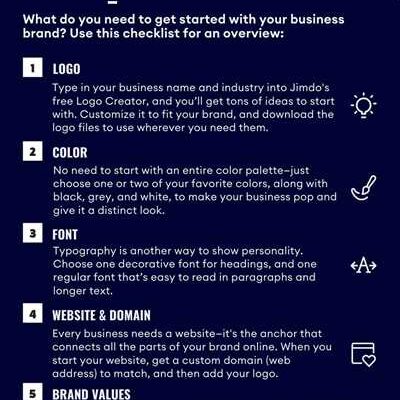
When starting a new business, branding is one of the key aspects that can define its success. For startups, it is especially important to establish a strong brand identity from the beginning. If you’re looking to build a successful startup, it helps to understand why branding matters and how it can help you stand out from the competition.
One of the most common misconceptions about branding is that it is only about logos and design. While these are important aspects of branding, there is much more to it. Branding is about defining the purpose, values, and proposition of your startup. It is about telling a compelling story that resonates with your target audience. It is about giving people a reason to choose your product or services over others.
When it comes to branding, you should be familiar with your target audience and what they are looking for. Understanding their needs and preferences will help you create a brand that appeals to them. Additionally, you should define the values that your startup stands for and the story behind it. This will not only help you connect with your audience on a deeper level but also attract investors who align with your vision.
Building a strong brand requires careful planning and consideration. It is important to choose a logo and design that reflect your brand’s values and identity. Your logo should be memorable and recognizable, and it should convey the essence of your startup. It is worth investing in professional design services if you have the budget, as a well-designed logo can leave a lasting impression on your audience.
Another aspect to consider when branding your startup is the open and transparent culture you create as an employer. A strong employer brand will attract talented individuals who share your values and are passionate about what you’re trying to achieve. This will not only help you build a dedicated and motivated team but also enhance your brand’s reputation in the market.
In conclusion, branding is of utmost importance when starting a new business. It goes beyond just logos and design; it is about defining your startup’s purpose, values, and proposition. It helps you connect with your target audience and differentiate yourself from the competition. By investing in branding and creating a strong brand identity, you will be on the right track towards success.
- Building a Strong Brand Identity for Your Startup
- Why does brand identity matter for startups?
- What misconceptions should you avoid when building a brand identity?
- How can you define your startup’s brand identity?
- How can branding help startups with a limited budget?
- What are some additional sources that can help you build a strong brand identity?
- Branding for startups: Why it matters
- Q How should startups go about building their employer brand identities
- Design your logo
- Will it be worth it
- Sources
Building a Strong Brand Identity for Your Startup
When starting a business, it’s important to prioritize building a strong brand identity. Your brand identity is how you define your startup’s values, purpose, and audience. It helps familiarize people with your product or service and sets you apart from your competitors. In this article, we will explore the importance of brand identities for startups and provide some tips on how to build a successful one.
Why does brand identity matter for startups?
Brand identity matters because it gives your startup a clear and unique identity in the market. It helps you define and communicate your brand’s values, mission, and purpose to potential customers. Additionally, a strong brand identity can attract investors who are looking for startups with a clear value proposition and a well-defined target audience.
What misconceptions should you avoid when building a brand identity?
When building a brand identity, it’s important to avoid misconceptions that can hinder your success. Some common misconceptions include thinking that branding is only about logos and design, or that it’s something only big companies need to worry about. In reality, branding is about much more than just a logo – it’s about telling a story and creating an emotional connection with your audience, regardless of the size of your business.
How can you define your startup’s brand identity?
To define your startup’s brand identity, start by asking yourself some important questions:
- What is your company’s purpose?
- What are your values and beliefs?
- Who is your target audience?
- What makes your product or service unique?
By answering these questions, you can gain a better understanding of your startup’s identity and what sets it apart from others. This clarity will help you create a brand that resonates with your target audience and communicates your unique value proposition.
How can branding help startups with a limited budget?

Even if you have a limited budget, you can still build a strong brand identity for your startup. The key is to focus on the essentials and prioritize where your limited resources will have the most impact. Instead of investing heavily in expensive advertising campaigns, for example, you can allocate your budget to professional logo design and creating a visually appealing website that reflects your brand’s values.
What are some additional sources that can help you build a strong brand identity?
Aside from defining your purpose, values, and target audience, there are many other sources that can help you build a strong brand identity. These sources include conducting market research to understand your target customers, studying successful brands in your industry, and seeking feedback from your existing customers. Additionally, working with branding professionals or consulting online resources can provide valuable insights and guidance throughout the process.
In conclusion, building a strong brand identity is crucial for startups. It helps define your startup’s purpose, values, and target audience, and sets you apart from competitors. By investing time and effort into building a strong brand identity, you’ll create a foundation for long-term success and establish a strong connection with your customers and investors.
Branding for startups: Why it matters
When starting a new business, branding may not be the first thing on your mind. You may be more concerned with developing your product or service, finding investors, or building your team. However, branding is a crucial aspect that should not be overlooked, especially for startups.
Branding helps define your startup’s identity and purpose. It is how you communicate who you are, what you do, and what you stand for. This is important not only for potential customers, but also for investors, employees, and anyone else who may come into contact with your brand.
By building a strong brand, you are more likely to attract the right audience and build trust with your target market. A well-defined brand helps people understand the value you bring and why they should choose your product or service over others in the market. It helps differentiate you from competitors and makes you memorable in the minds of consumers.
Branding also plays a role in attracting talent. As a startup, you’ll be competing with more established companies for top talent. A strong brand can position you as an employer of choice and attract people who align with your values and vision. Candidates are more likely to be interested in working for a company that has a clear and compelling brand identity.
One of the misconceptions about branding for startups is that it requires a large budget and hiring a professional design agency. While having the resources to invest in branding can certainly be beneficial, there are also many cost-effective ways to create a strong brand identity. You can start with the basics – a well-designed logo, a clear value proposition, and consistent messaging – and evolve your brand as your business grows.
Another misconception is that branding is only about logos and aesthetics. While design is an important aspect of branding, it is not the only factor. Your brand should also tell a story and evoke emotions in your audience. It should communicate the essence of your business and what sets you apart.
So, why does branding matter for startups? It matters because it helps you establish a strong foundation for your business. It helps you define your identity, communicate your value, and attract the right audience. It sets you apart from competitors and gives you a competitive edge. Whether you’re just starting out or looking to take your startup to the next level, investing in branding is definitely worth it.
Q How should startups go about building their employer brand identities
Building a strong employer brand identity is crucial for startup success. It helps attract top talent, investors, and customers. But how should startups approach it?
1. Define your values and purpose: Start by understanding your startup’s core values and purpose. What are you trying to achieve? What do you stand for? By defining these, you’ll have a solid foundation for building your employer brand identity.
2. Know your audience: Consider who you’re trying to attract as employees. What are their values and expectations? Understanding your target audience will help you tailor your employer brand message to resonate with them.
3. Tell your story: Your employer brand should tell a compelling story about your startup. Explain why you exist, what problem you’re solving, and how your product or service adds value. People are more likely to be attracted to a startup with a story that resonates with them.
4. Design your brand: Your employer brand identity includes more than just a logo. It’s about the overall visual representation of your startup, including colors, fonts, and design elements. Invest in good design to create a strong and visually appealing brand.
5. Be open and authentic: Authenticity matters in employer branding. Be transparent about your startup’s culture, work environment, and opportunities for growth. Share real stories from your employees to give potential candidates an honest look into what it’s like working at your startup.
6. Give your employees a voice: Your employees are your best brand ambassadors. Encourage them to share their experiences and insights on social media or through testimonials. It will help showcase your startup as a great place to work.
7. Choose the right channels: Choose the channels that will help you reach your target audience most effectively. It could be social media platforms, industry-specific websites, or networking events. Be present where your potential employees are looking.
8. Consider your budget: Building an employer brand identity doesn’t have to be expensive, but it does require some investment. Determine your budget and allocate it wisely to activities that will have the most impact on your target audience.
9. Educate investors: Employer brand identity is not just about attracting employees; it also matters to investors. Showcasing a strong brand identity can give investors confidence in your startup’s values and potential for success.
10. Don’t forget the misconceptions: There are many misconceptions about employer brand identity, such as it being only for big companies or that it’s all about perks. Clear any misconceptions and inform people about the true value and importance of employer branding for startups.
Building an employer brand identity is worth it for startups. It helps attract the right people and gives your startup a competitive advantage. By following these steps, you’ll be on your way to building a strong employer brand identity that will set your startup up for success.
Design your logo
When it comes to branding your startup, one of the most important things you can do is design a logo that helps define your brand and resonates with your target audience. Your logo is the visual representation of your business, and it’s what people will see and remember when they think about your company.
Designing a logo can be a daunting task, especially if you’re not familiar with graphic design. But don’t worry, there are plenty of resources out there that can help you. If you have the budget, you can hire a professional designer who specializes in logo design. They can help you create a strong and memorable logo that aligns with your brand’s values and tells a story about your product or service.
If you’re looking to save some money, there are also many online tools and platforms that can help you design a logo for your startup. These platforms often provide pre-designed templates that you can customize to fit your brand. While they may not be as unique as a custom-designed logo, they can still be a good option for those just starting out or with a limited budget.
When designing your logo, it’s important to keep in mind the purpose and values of your brand. Your logo should reflect your brand’s unique value proposition and communicate what makes your startup different from others in the market. It should also be memorable and easy to recognize, as it will be used on all of your marketing materials.
Another common misconception about logos is that they need to be complicated and intricate to be effective. In reality, simplicity is often key when it comes to logo design. A simple and clean logo can be more memorable and versatile, and it’s easier for people to understand and connect with.
Lastly, don’t forget about the importance of color in your logo design. Different colors can evoke different emotions and have different meanings, so it’s important to choose colors that align with your brand’s values and the message you want to convey. Do some research into color psychology and choose colors that will resonate with your target audience.
In conclusion, designing a logo for your startup is an important step in building your brand. Your logo will help define your brand’s identity and give people an immediate impression of what your business is all about. Whether you choose to invest in a custom-designed logo or use an online tool, make sure that your logo is aligned with your brand’s purpose and values.
Will it be worth it
When starting a startup, it’s natural to consider the cost and effort involved in branding. You may wonder if it’s really worth the time and budget to invest in building a brand identity. However, branding is not just about creating a logo or choosing a name for your business. It goes much deeper than that.
Branding is about defining the purpose and values of your startup. It helps you give your business a distinct identity and sets you apart from your competitors. When done right, branding can attract the right audience, including potential investors and employees. It also helps build a strong reputation and can be a key factor in the success of your startup.
One of the common misconceptions about branding is that it’s only for big companies with large budgets. However, even for startups with limited resources, branding is essential. Investing in branding early on can help create a strong foundation for your business and make it more likely to succeed.
Another misconception is that branding is just about creating logos and designing websites. While these are important elements of branding, they are not the only ones. Branding involves the entire customer experience, from the moment they hear about your startup to the moment they make a purchase or become loyal customers.
Branding also helps you define your value proposition. It allows you to communicate why your product or service matters and how it can help people. This is crucial for startups looking to differentiate themselves in a crowded market.
Additionally, branding helps establish your startup as an employer of choice. It attracts talent who are aligned with your company’s values and mission. It also helps create a sense of belonging and purpose for your employees, which can lead to higher job satisfaction and productivity.
Furthermore, branding helps open doors and opportunities for partnerships and collaborations. When your startup has a strong brand, it becomes more familiar and trusted among potential partners, investors, and customers.
In conclusion, while branding may require time, effort, and resources, it is definitely worth it for startups. It helps define your startup’s identity, attract the right audience, differentiate yourself, and establish a strong reputation. So, if you’re starting a startup, do not underestimate the importance of branding and the value it can bring to your success.
Sources
When it comes to building a strong brand identity for your startup, there are many sources you can turn to for help. These sources will be invaluable in defining your brand story, values, and mission. They will also help you choose a logo that reflects your brand’s identity and communicates its value proposition to your audience.
1. People: One of the most important sources of inspiration for your brand identity will be the people behind your startup. Their values, goals, and purpose will be closely aligned with the brand you’re trying to build. By understanding what matters to them, you’ll be able to define what matters to your audience.
2. Logos: Your logo will be the face of your startup, so it’s worth investing time and resources into its design. A well-designed logo can help you stand out from the competition, attract investors, and give your startup an air of professionalism and success.
3. Story: Every startup has a unique story behind it, and sharing that story with your audience can help establish an emotional connection. By defining your startup’s story, you’ll be able to create a brand identity that resonates with the people you’re looking to reach.
4. Q&A Content: Open Q&A sessions with your target audience can be a great source of inspiration for your brand identity. By understanding their values and what they’re looking for in a product or employer, you’ll be able to build a brand that aligns with their needs and aspirations.
5. Misconceptions: It’s important to be aware of and address any misconceptions people may have about your brand or industry. By clarifying misconceptions, you’ll be able to build trust with your audience and establish your brand as a go-to source of information.
6. Budget: Your budget will play a role in defining your brand identity. While it’s important to invest in professional design and marketing services, it’s also important to consider what you can realistically afford. There are many cost-effective options available for startups with limited budgets.
Remember, the success of your startup will depend on how well you define and communicate your brand identity. By leveraging these sources, you’ll be well on your way to building a strong brand that resonates with your audience.
| 7. AIContentfy: AIContentfy is an AI-powered content creation tool that can help you generate high-quality content to support your brand identity. By using AIContentfy, you can create engaging and relevant content that reflects your brand’s values and resonates with your audience. |










